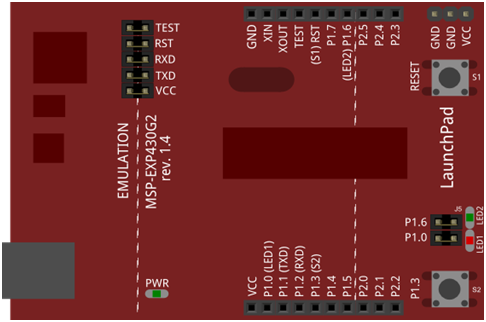Examples > Strings
String Comparison Operators
The String comparison operators, ==, !=,>, < ,>=, <= , and the functionsequals() and equalsIgoreCase() allow you to make alphabetic comparisons between Strings. They're useful for sorting and alphabetizing, among other things.
Relevant Groundwork
The operator == and the function equals() perform identically. It's just a matter of which you prefer. So
if (stringOne.equals(stringTwo)) {
is identical to
if (stringOne == stringTwo) {
The greater than and less than operators evaluate strings in alphabetical order, on the first character where the two differ. So, for example "a" < "b" and "1" < "2", but "999"> "1000" because 9 comes after 1.
Caution: String comparison operators can be confusing when you're comparing numeric strings, because you're used to thinking of them as numbers, not strings. If you have to compare numbers, compare them as ints, floats, or longs, and not as Strings.
Hardware Required
- MSP-EXP430G2 LaunchPad
Circuit
Only LaunchPad is required for this example.

image developed using Fritzing. For more circuit examples, see the Fritzing project page.
Schematic

Code Explanation
In the program, we compare two strings in several different ways.
Code
/*
Comparing Strings
Examples of how to compare strings using the comparison operators
created 27 July 2010
modified 2 Apr 2012
by Tom Igoe
This example code is in the public domain.
*/
String stringOne, stringTwo;
void setup() {
// Open serial communications and wait for port to open:
Serial.begin(9600);
stringOne = String("this");
stringTwo = String("that");
// send an intro:
Serial.println("\n\nComparing Strings:");
Serial.println();
}
void loop() {
// two strings equal:
if (stringOne == "this") {
Serial.println("StringOne == \"this\"");
}
// two strings not equal:
if (stringOne != stringTwo) {
Serial.println(stringOne + " =! " + stringTwo);
}
// two strings not equal (case sensitivity matters):
stringOne = "This";
stringTwo = "this";
if (stringOne != stringTwo) {
Serial.println(stringOne + " =! " + stringTwo);
}
// you can also use equals() to see if two strings are the same:
if (stringOne.equals(stringTwo)) {
Serial.println(stringOne + " equals " + stringTwo);
}
else {
Serial.println(stringOne + " does not equal " + stringTwo);
}
// or perhaps you want to ignore case:
if (stringOne.equalsIgnoreCase(stringTwo)) {
Serial.println(stringOne + " equals (ignoring case) " + stringTwo);
}
else {
Serial.println(stringOne + " does not equal (ignoring case) " + stringTwo);
}
// a numeric string compared to the number it represents:
stringOne = "1";
int numberOne = 1;
if (stringOne.toInt() == numberOne) {
Serial.println(stringOne + " = " + numberOne);
}
// two numeric strings compared:
stringOne = "2";
stringTwo = "1";
if (stringOne >= stringTwo) {
Serial.println(stringOne + " >= " + stringTwo);
}
// comparison operators can be used to compare strings for alphabetic sorting too:
stringOne = String("Brown");
if (stringOne < "Charles") {
Serial.println(stringOne + " < Charles");
}
if (stringOne > "Adams") {
Serial.println(stringOne + " > Adams");
}
if (stringOne <= "Browne") {
Serial.println(stringOne + " <= Browne");
}
if (stringOne >= "Brow") {
Serial.println(stringOne + " >= Brow");
}
// the compareTo() operator also allows you to compare strings
// it evaluates on the first character that's different.
// if the first character of the string you're comparing to
// comes first in alphanumeric order, then compareTo() is greater than 0:
stringOne = "Cucumber";
stringTwo = "Cucuracha";
if (stringOne.compareTo(stringTwo) < 0 ) {
Serial.println(stringOne + " comes before " + stringTwo);
}
else {
Serial.println(stringOne + " comes after " + stringTwo);
}
delay(10000); // because the next part is a loop:
// compareTo() is handy when you've got strings with numbers in them too:
while (true) {
stringOne = "Sensor: ";
stringTwo= "Sensor: ";
stringOne += analogRead(A0);
stringTwo += analogRead(A5);
if (stringOne.compareTo(stringTwo) < 0 ) {
Serial.println(stringOne + " comes before " + stringTwo);
}
else {
Serial.println(stringOne + " comes after " + stringTwo);
}
}
}
Working Video
(Insert Video Here)Try it out:
- Use string comparison to blink an LED when strings are equal
See Also
Corrections, suggestions, and new documentation should be posted to the Forum.
The text of the Energia reference is licensed under a Creative Commons Attribution-ShareAlike 3.0 License. Energia reference is based on the Arduino reference. Code samples in the reference are released into the public domain.